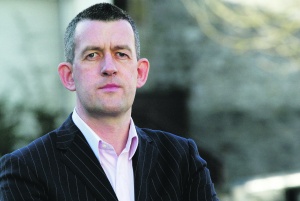
THE National Drugs Strategy is doomed to fail if the necessary funding is not made available to tackle the heroin epidemic that’s affecting parts of Limerick City.
That’s according to local Sinn Féin TD Maurice Quinlivan who is also a member of the Mid-West Regional Drugs and Alcohol Forum (MWRDAF).
Speaking on a motion on Local Drug and Alcohol Task Forces in the Dáil last Thursday, Deputy Quinlivan said that the National Drugs Strategy was doomed to fail if the necessary funding was not made available to tackle the huge problem across parts of Limerick City.
“The reality is that heroin, alcohol, gambling and the misuse of prescription drugs are causing huge problems across Limerick city.
“Limerick is without a detox centre which leads to having a huge waiting list for services, while leaving staff under huge pressure to deliver basic services,” Deputy Quinlivan added.
“There are many addiction groups in Limerick who are having a very positive effect on people’s lives, however they are starved of funding as the MWRDAF is not properly resourced”.
Referring to local groups that are funded by the MWRDAF, Deputy Quinlivan explained that the community substance misuse team deals with young people with addiction problems. The Northstar Family Support Project deals with families who are affected by a family member’s substance misuse.
The Limerick City Community Network, which is a voluntary group comprising people across all communities in Limerick City, are also supported by the local task force.
“I also mention the probation and linkage in Limerick scheme, the Ana Liffey Drug Project, the Saoirse addiction treatment centre and Novas Initiatives, all of which are doing great work in Limerick”.
He explained that since 2008, the Mid-West Regional Drugs and Alcohol Forum had taken cuts of more than 50 per cent.
“These cuts have negatively impacted and prevented the delivery of drug and alcohol services that are urgently needed in Limerick and across the entire mid-west region”.
“The failure to properly fund the Local Drug and Alcohol Task Forces demonstrates the government’s indifference to the damage and devastation that drugs cause to people, families and communities.
“This is simply not acceptable. It is unsustainable and for that reason the problem is getting worse,” he added.
Acknowledging the important work being done by the 24 drug and alcohol task forces throughout the country, Minister of State Catherine Byrne said that she established a working group to revise and update the handbook for task forces last year. This is due to be completed by next June.
“From this process we will have a new code of governance for task forces, in line with best practice in the community, voluntary and charitable sectors, and my Department will support its implementation in 2019.
“The revision of the task force handbook is an important step in the development of a performance measurement system, and an implementation plan to operationalise such a system will be developed by 2020.
“The HSE oversight responsibilities of drug and alcohol task forces to ensure that service provision meets identified needs and that there is accountability and transparency for public money provided by the Department of Health.
“I have invited the task forces to a meeting in the Department of Health at the end of the month to begin this process”, Minister Byrne said.
This year I also intend to develop two new schemes to deliver an integrated public health approach to drugs and alcohol, as set out in the national drugs strategy. The first will provide targeted, appropriate and effective services for young people at risk of substance abuse, focused on disadvantaged areas, while the second will support evidence-based approaches to mobilising community action on alcohol. Both schemes will have funding of €250,000 on a multi-annual basis.
by Miranda Leahy









